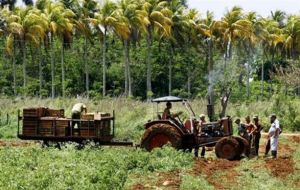MercoPress. South Atlantic News Agency
Cuba drastically slashes “farm bureaucracy” to boost food production
 Family farms and cooperatives provide 70% of Cuba’s perishables but the country still imports 80% of food consumed
Family farms and cooperatives provide 70% of Cuba’s perishables but the country still imports 80% of food consumed One of the major ills of Cuba’s state-run agricultural enterprises is “the excess of non-productive personnel,” Communist Party daily Granma said this week. The newspaper estimated the number of redundant employees in the state farming sector at 89,000, or 26% of the total.
“The urgency to increase production of food and reduce imports has accelerated the solution of this old program, which engenders bureaucracy, raises costs, hampers productivity, creates disorder and prevents the worker from improving his income,” Granma said.
Among the measures adopted by the Agriculture Ministry is setting the goal of eliminating at least 10% of the superfluous jobs and halving the number of managers, the daily said.
Since 2007, the government has closed 83 state agricultural enterprises and re-organized 473 work units. Agricultural production was down 7.4% this year through September compared to the same period in 2008. Much of the decline was blamed on damage to banana plantations by hurricanes last year.
Pilot programs have shown that bureaucracy can be cut at least in half without difficulties, the newspaper said. At one state farm in Havana province, it said the number of supervisors was reduced from 91 to 15 and the land divided into 130 fincas, with led to greater diversification of products.
International agriculture analyst Jerry Hagelberg said it remains to be seen if the reorganization will boost food output.
“Time will tell whether this measure will be much more successful than previous failed attempts to raise efficiency, as long as these farms continue to be run by the state, the marketing of farm products remains controlled by the state, and Cuban agriculture does not get the necessary capital and production inputs,” he said.
Cuba had around 250,000 family farms and 1,100 private cooperatives before the land-lease program began, which together produced around 70% of the country's produce on less than one-third of the land.
President Raul Castro, who took the reins in July 2006 after older brother Fidel was stricken with a severe illness, has repeatedly complained about Cuba’s poor agricultural productivity, noting that half the island’s arable land is sitting unused.
Raul said earlier this year that the “maximum priority” is increasing domestic farm production, given rising international prices and Cuba’s reliance on imports for more than 80% of the food consumed by the island’s 11.2 million residents.
The government has already reduced the amount of food that Cubans receive at subsidized prices via their ration cards. Cuba is suffering one of its worst economic crises since the revolution that brought Fidel Castro to power in January 1959.
The world economic slump has squeezed Cuba’s two main sources of hard currency: nickel exports and tourism, while Cuban families have experienced a decline in remittances from relatives in the United States.
As of January, imports were outpacing exports 5-1, and the volume of foreign trade has fallen 36% compared with last year. The Cuban government is now forecasting an economic expansion of only 1.7% in 2009. Official statistics show growth in gross domestic product fell from 12.5% in 2007 to 4.3% last year.




Top Comments
Disclaimer & comment rulesCommenting for this story is now closed.
If you have a Facebook account, become a fan and comment on our Facebook Page!